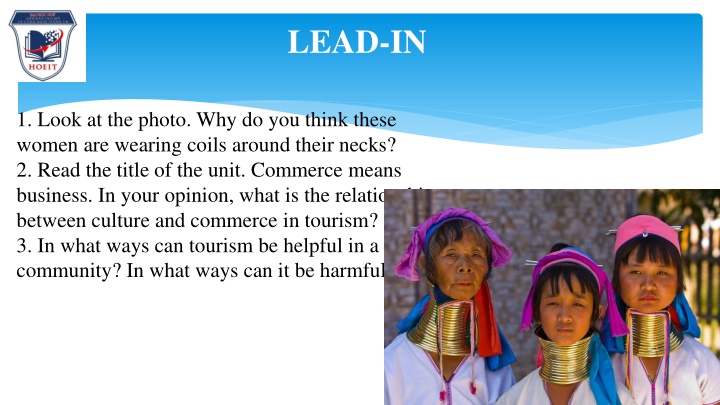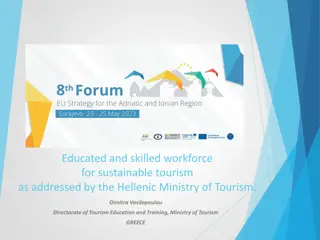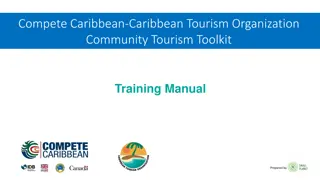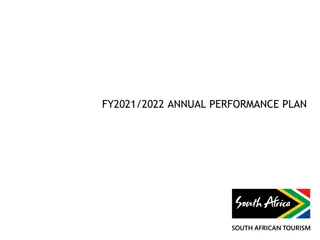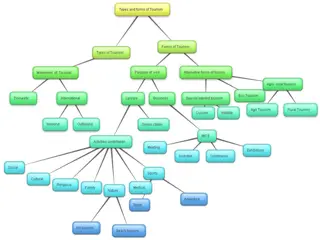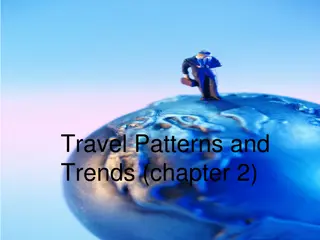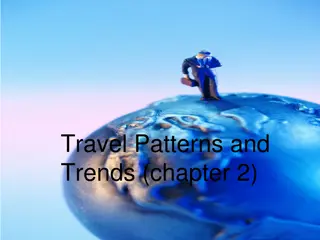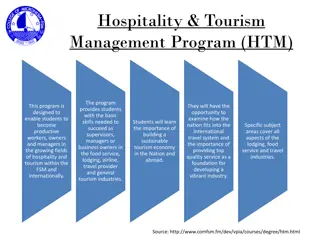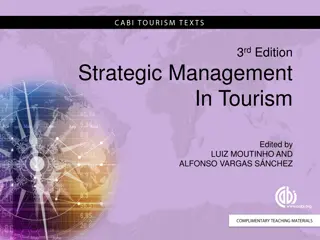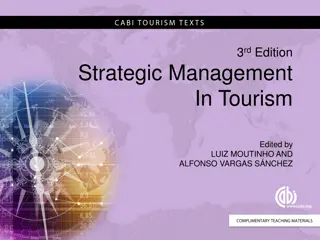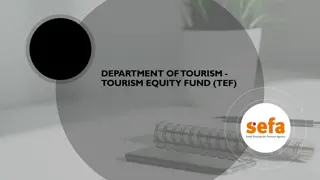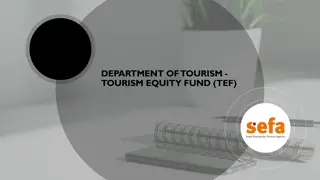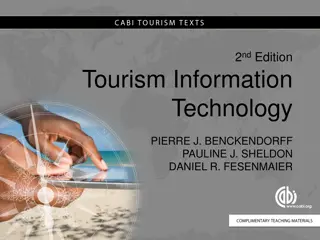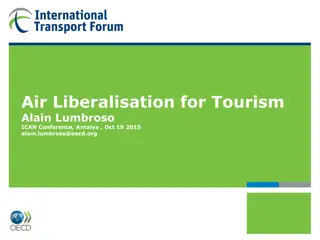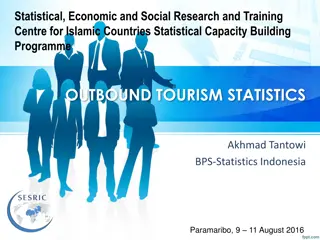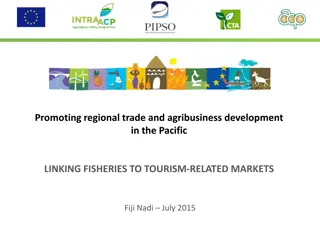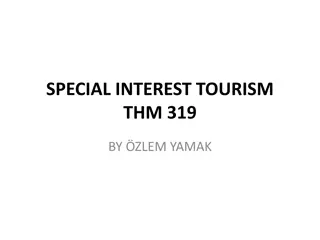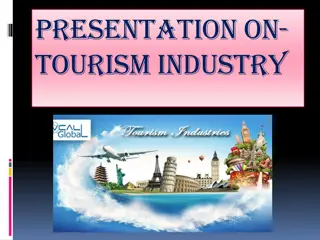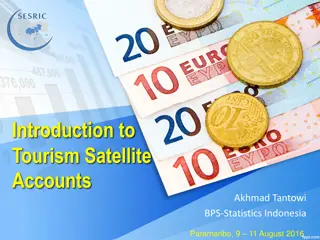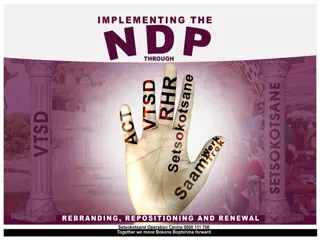Culture and Commerce in Tourism
Explore the intricate relationship between culture and commerce in the realm of tourism. Delve into the impacts, both positive and negative, that tourism can have on communities and environments. Engage in discussions about the intertwined dynamics of cultural identity and economic activities in the context of travel and leisure.
Download Presentation

Please find below an Image/Link to download the presentation.
The content on the website is provided AS IS for your information and personal use only. It may not be sold, licensed, or shared on other websites without obtaining consent from the author.If you encounter any issues during the download, it is possible that the publisher has removed the file from their server.
You are allowed to download the files provided on this website for personal or commercial use, subject to the condition that they are used lawfully. All files are the property of their respective owners.
The content on the website is provided AS IS for your information and personal use only. It may not be sold, licensed, or shared on other websites without obtaining consent from the author.
E N D
Presentation Transcript
LEAD-IN 1. Look at the photo. Why do you think these women are wearing coils around their necks? 2. Read the title of the unit. Commerce means business. In your opinion, what is the relationship between culture and commerce in tourism? 3. In what ways can tourism be helpful in a community? In what ways can it be harmful?
UNIT 6: CULTURE AND COMMERCE MA. DAU THI KHANH TOAN
Objectives Knowledge: - List some words relating to culture, commerce and tourism - Expressions of predictions and suggestions Skills: - Improve language skills: speaking and listening, - Expressions of predictions and suggestions - Talking about culture and tourism
Objectives Attitude: - Be active, excited and enthusiastic in learning. - Build a habit of using English in their careers.
1. VOCABULARY Cross out the word that doesn't belong in each group. Consult a dictionary if necessary. 1. zoo 2. afford 3. controversy 4. degrading 5. make a living 6. preserve 7. season 8. souvenir 9. tourist attraction 10. tradition 11. community animal park vsildlife center borrow from agreement painful get paid care for period of time equipment point of interest belief city have money for pay for argument polite earn a salary develop days of the week time of year reminder place to see habit small town debate embarrassing enjoy life save keepsake guidebook change village
2. CREATE Work in a small group. Each person thinks of a tourist destination he or she has visited. Take turns making a short presentation about the destination. Answer the questions. Use the vocabulary from the box. Questions 1. What tourist destination did you visit? 2. What are the major tourist attractions? 3. What impact does tourism have on the locals? 4. What impact does tourism have on the environment?.
3. SPEAKING SKILL PREDICTIONS WITH WILL AND IF-CLAUSES Use will and will not (won't) to make predictions. -Will is usually contracted in speech: It will rain again next week. Tourists won't come to the shops and restaurants. They'll stay home -Use probably with will to show less certainty. Business will probably be slow all week. probably won't make enough money. -Use if-clauses to talk about possible results in the future. If the rain continues, we'll have a lot of problems
3. SPEAKING SKILL Work with a partner. Read about the people who live and vacation on Cape Cod. Take turns asking about the future and making predictions. What will happen to these people if tourism increases on Cape Cod? What will happen if tourism decreases? A: What will happen to Joe if tourism increases? B: If tourism increases, Joe's restaurant will probably get busier. A: I agree. He'll serve more seafood every day. He'll probably need to hire
3. SPEAKING SKILL MAKING SUGGESTIONS Work with a partner. Read and listen to the conversation between two tourists in Thailand. Notice the suggestions in bold. Which are stronger? Which are weaker? A: What do you want to do tomorrow? One option is to visit an elephant park. B: That's a great idea! Then we could go to Padaung to see the long-necked women. A: Let's not go there. I think it's degrading for the women. B: OK, but we definitely shouldn't miss the elephant park.
3. SPEAKING SKILL Read each pair of suggestions with your partner. Circle the one that is stronger. Discuss the difference between the two suggestions. 1. a. Let's take a guided tour. b. How about taking a guided tour? 2. a. We might want to buy souvenirs. b. We should definitely buy souvenirs. a. I think we should eat at the hotel. b. One option is to eat at the hotel
Animals Go to Dusit Zoo to see wild animals. Visit the Snake Farm and see venom l removed from snakes to make medicine. Volunteer at an elephant park and help take care of the elephants. Sightseeing Go to the National Museum and learn about Thai art. Visit the Grand Palace to see where Thai kings lived. Go to the Wat Sai floating market, where farmers sell food on boats. Shopping Buy books about Thailand from Asia Books. Find fashionable women's clothing at Siam Square shops. Go to Lao Song Handicrafts to buy traditional Thai crafts and souvenirs.
5. ALTERNATIVE SPEAKING TOPICS Discuss one of the topics. use the vocabulary and grammar frcrn the unit. 1. If you were a travel agent in your home country, what kinds of tours would you book? What areas would you take people to visit and why? What would the impact of tourism be on those areas? 2. For some places, tourism is the most important way to make money. For example, Thailand used to make most of its money from growing rice, but now more money comes from tourism. What are the pros and cons of relying on tourism as a source of money?
6. CONSOLIDATION Commerce and culture
7. HOMEWORK UNIT PROJECT Some tourists use their vacation time to help others or help the environment. For example, a volunteer could go to a poor community and build homes for poor people. These types of vacations are called "service vacations" or "volunteer vacations." STEP Do research to find an example of-a service vacation. You can . . . -look for service vacations or volunteer vacations on the Internet. -look for brochures or magazines about service vacations from environmental groups (for example, EarthWatch) or human aid groups (for example, Global Volunteers). S
7. HOMEWORK UNIT PROJECT STEP 2: Prepare a short report to share with the class. Use the questions as a guide: 1. What is the destination of this vacation? 2. can you do on this vacation? 3. Can people who choose this vacation really help the environment or the people who live nearby? If so, how? If not, why not? 4. Would you go on this vacation? Why or why not?
